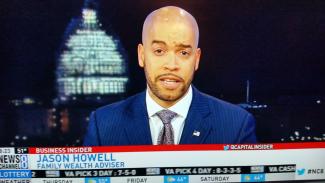
The False Equivalency of Financial Advice
All financial advice is not the same. For far too long, the leaders and lobbyists of the largest financial services companies have intentionally confused the public about what is or isn't advice. Do most financial professionals give advice? Yes. Are they all willing to take legal responsibility for that advice? No.
Depending on whose numbers you use, there are just over 300,000 US based financial advisors in the country. That number is deceptive because the use of the title "advisor" or "adviser" is not yet regulated so your grandma could wake up one day and call herself a financial advisor. If that happened we might have to contact global research and consulting firm Cerulli Associates to let them know there was one more! As good as it would be to have one more female advisor - in this unnecessarily male dominated field - unless your grandma had the licensing, she could publicly but not "officially" qualify.
Unfortunately all it does take to "qualify" as an employed financial advisor is passing a licensing exam that may take an educated person 6 to 8 weeks of study. These newly minted "financial advisors," who may not have a college degree or related experience can very ably slip on a suit, a tie, cufflinks - or all three! - and call themselves a financial advisor. You won't see that title on their business cards because their bosses know the possible legal ramifications. But at parties and networking events (where it counts) that's how they will introduce themselves. So if you can't tell apart good financial advisors by asking whether they are licensed or by looking at their suit - actually, you can tell by looking at their suit but I digress - how can you? The answer depends in part on:
- What you want from financial advice
- Laws that govern the financial industry
LAWS
First, let me share something that's probably not a surprise: some financial advisers think they are better than others. And equally unsurprising, those other advisers resent being looked down upon. This of course would have been the case no matter what the laws said but much of the disdain could have been avoided if there was less ambiguity in the law (or laws) of advice.
Today we advisors find ourselves arguing over who is a "fiduciary" rather than what you might expect us to compete over: financial knowledge, "bed side" manner and experience. How did that happen? For that answer we can go back 10 years to the Great Recession of 2008 and further back 89 years to the Great Depression of 1929. In each case, our United States Congress tasked the Securities and Exchange Commission (SEC) to fix what was wrong with the financial markets -the financial industry (Ha!). And in each case the intent was well meaning. The Investment Advisers Act of 1940 was meant to cure society of the ills of hucksters and charlatans who fooled the public into buying products (stocks) when they had no idea what in fact, they were buying. Initially the 1940 act was meant to compel people who gave advice and charged for it - the true mark of a professional - to register with the SEC so they could be monitored. Later, this act led to a "fiduciary duty of care" meaning in effect, that investment advisers would be held legally responsible for their advice. That's a big deal. Since 1940, it should have been clear who were the aptly titled "advisors" (people hired to give advice for a fee) and who were the salespeople (people paid a commission for their ability to sell financial products). But as the decades have passed since 1940, those distinctions have blurred into near nonexistence.
The 2010 Dodd-Frank Wall Street Reform and Consumer Protection Act had so many good intentions in reaction to the near loss of liquidity by global markets. Tucked into the 2,000 page law - this is why I link to Wikipedia - was the ask that the SEC conduct a study of regulatory standards. A 3-page excerpt from the American Bar Association does a glorious job of explaining the study and its legal ramifications on page 12 and 13. And keeping with the government's tradition of confusion in this space, on April 6, 2016, the U.S. Department of Labor (DOL) issued its infamous DOL Fiduciary Rule "expanding the investment advice fiduciary definition." This rule now meant that every broker, insurance agent, financial advisor or financial planner - no matter what you called yourself or what rules you think you were under - would now have to operate in the best interests of their clients when it came to retirement dollars or face legal liability. And it is after this rule where the leaders and lobbyists of the largest financial institutions - much larger than mine - display their true colors.
It is often said in Washington, DC that "elections have consequences" and in the case of the DOL Fiduciary Rule, that fact is in plain site. It was and is a rule meant to highlight the similarities between the ways all advisers now market themselves; regardless of their legal sandboxes provided by the 1940 Act. Since most firms advertised liked fiduciaries, it seemed reasonable to regulate them like fiduciary advisors. Today, the Department of Labor now opposes its own Obama Administration era ruling now that it is under the Trump Administration. There have been multiple court proceedings over the past 18 months that have sought to get rid of a rule that would impose legal responsibility upon the largest players in the financial industry. In nearly every case, the Financial Planning Coalition - the smallest players (like me) in the financial industry - succeeded in proving the merits of fiduciary responsibility to the public. And then came the decision in March of 2018 by the 5th Circuit Court of Appeals.
Michael Kitces, perhaps the most articulate writer, fellow practitioner and honest voice in this profession crafted a beautiful summary of the 5th Circuit Court details and rulings in his article, "How The Product Distribution Industry Beat DoL Fiduciary By Proving Their “Advisors” Aren’t Real Advisors." What's notable about the lobbying arm of the largest "product distributors" - insurance products, investment products - fighting against the DOL Rule is that this is hardly the first time they have presented their thousands of agents and brokers as mere salespeople in court while advertising them as trusted advisers in every other setting. The Public Investors Arbitration Bar Association (PIABA) is an international organization that represents investors in disputes with the securities industry. In their 2015 report, they noted significant investor losses attributable to conflicted invested advice. Beginning on page 8 of their nearly 100 page report, the largest brokerage and insurance companies solicit customers with the inferred promise of “advice” but when it comes to arbitration, these same firms argue that their [advisors, agents] salespeople have one duty: to execute transactions. In other words, these transactions need not necessarily be made in the best interest of the client. And these advisors/agents are under no obligation to render advice –good or otherwise.
The not so funny fact is that the arguments made by these brokers and insurance agent representatives are true. They are salespeople who do not render advice but rather distribute products on behalf of their firms. They may wear similar suits, they may have passed similar licensing exams or even sound like "fiduciary advisors" but when it comes to taking legal liability, there is a distinct difference. A broker or an agent of a brokerage firm or an insurance agency holds a fiduciary duty to their firm and not their client. This is not my opinion, this is the legal defense held by their attorneys as recently as 2015 and 2018.
WHAT YOU WANT
There is nothing inherently wrong with salespeople. I mean we're all a little squinty eyed at the prospect of meeting a "salesperson" but people who sell us stuff are so ubiquitous that it is a little disingenuous to say we dislike them all. I bought my Hyundai SUV for my kids from a salesperson. I bought my cell phone from a salesperson. I use both of those items daily. If you are looking for someone to sell you life insurance, then you can do no better than speaking with a licensed insurance agent. That person knows more about the product than someone who isn't licensed; and of course the more experience the better. I used to work for a life insurance company and I spent the first few months sitting in instructor-led classes with my mind blown. If you want an investment manager then finding any number of the "big name" brokerage companies to help you will work as well. The trouble only comes when you want comprehensive advice on the entire picture of your financial life. You know, that financial life that you only get one chance to live? In this case some advisors are more qualified than others and some are legally liable for their advice while others (salespersons) are not. How do you pick them out without asking to "see their (licensing) papers?" Ask how they are compensated.
We know that in life you get what you pay for. If you pay for someone with a life insurance license only, you are going to get a product recommended, from the perspective of someone who knows about life insurance. Ask a surgeon what to do about a bad back and you can assume the response will likely be surgery. Ask a pharmaceutical representative (salesperson) what to do about acid reflux and they are likely to recommend a pill. But if you asked your General Practitioner (GP) about either of these medical "problems" you might be led towards a different path because of their comprehensive approach to your medical care. GPs get paid to give advice on your comprehensive health and that advice is covered by professional "errors and omissions" insurance. If they get sued for malpractice, they could be held liable for damages. If you want an advisor to give you similarly, comprehensive, fiduciary advice that they are held liable for, find an advisor that gets paid for advice.
You will find advisors (or "advisers" with an "e") under monikers like "fee-only" or "fiduciary" but even those terms can get confusing (see above). Simply ask you advisor of whatever stripe, "How are you compensated?" Any honest professional will tell you. If you're in the market for something specific and you are comfortable with your knowledge of that specificity, than a broker or an agent will suffice. If you are looking for comprehensive advice to assess your situation before making a purchase, then find someone who gets paid to render advice. Clients get what they pay for and advisors typically focus their time and knowledge on the things for which they are paid.
CONCLUSION
All advice is not the same for the very reason that all advice is not advice at all. Suggestions by some financial professionals you interact with may just be "sales talk." That's not my opinion, that is the legal opinion of the attorneys who represent them. In a world where there are many titles, designations and many suits where you can "Buy 1 and Get 2 Free," the best way to pick a financial advisor is by evaluating each one for their merits: their expertise, their experience and by default, their compensation model. I have yet to run into a group of saints or unreconcilable sinners within the financial industry. I have seen people with less knowledge and experience in certain categories. I see many who are not legaly liable for any of their so-called "advice." Proper evaluation by the investing public is necessary for your own best interests. The more attuned you are to what the "advisor" actually does with their advising, is the more likely we advisors will be forced to reveal what we know, what we don't know and what can we actually do for you.
And the truth will set us free.
Jason Howell is a CERTIFIED FINANCIAL PLANNER™ who specializes in working with Generation X couples who are intentional about their financial lives. He is President of Jason Howell Company, an independent, fiduciary, financial planning firm. Jason is also an adjunct instructor of personal finance at American University’s Kogod School of Business and is Past President of George Mason’s School of Business Alumni Chapter. He is a former United States Congressional candidate and has been featured as both an independent political strategist and an established financial expert on ABC’s News Channel 8, US News & World Report, Yahoo Finance, Readers Digest, Nasdaq.com and the New York Times. Jason shares his home with a beautiful and patient wife, two daughters and 1990’s era modern rock.
To engage Jason Howell Company as a prospective client, just click through this one-page form: One-Page Form


